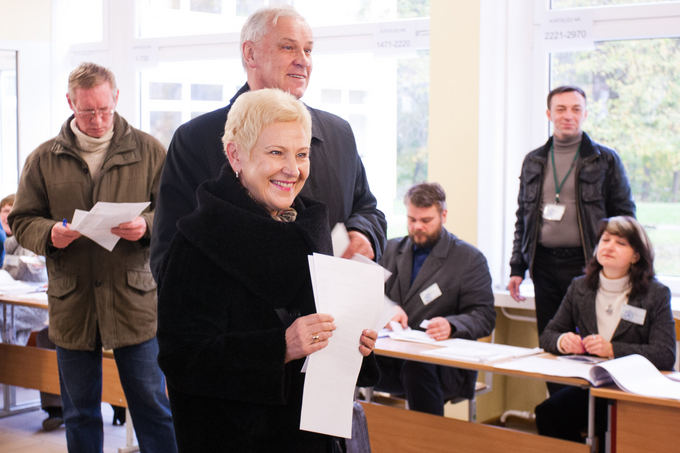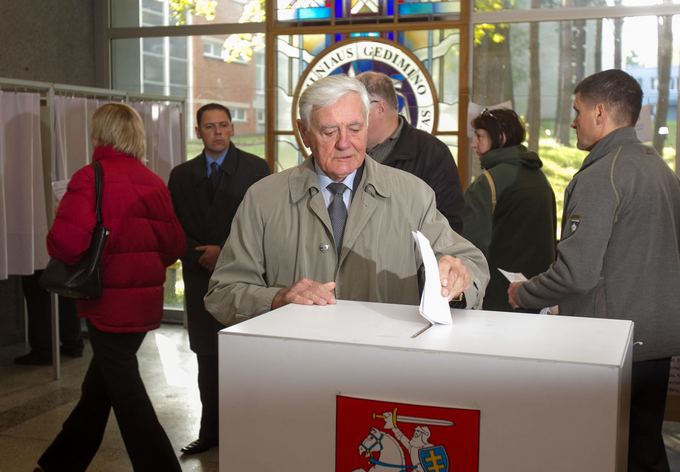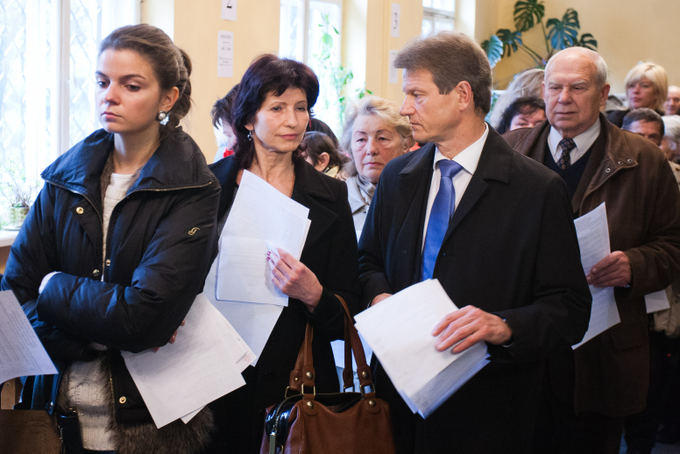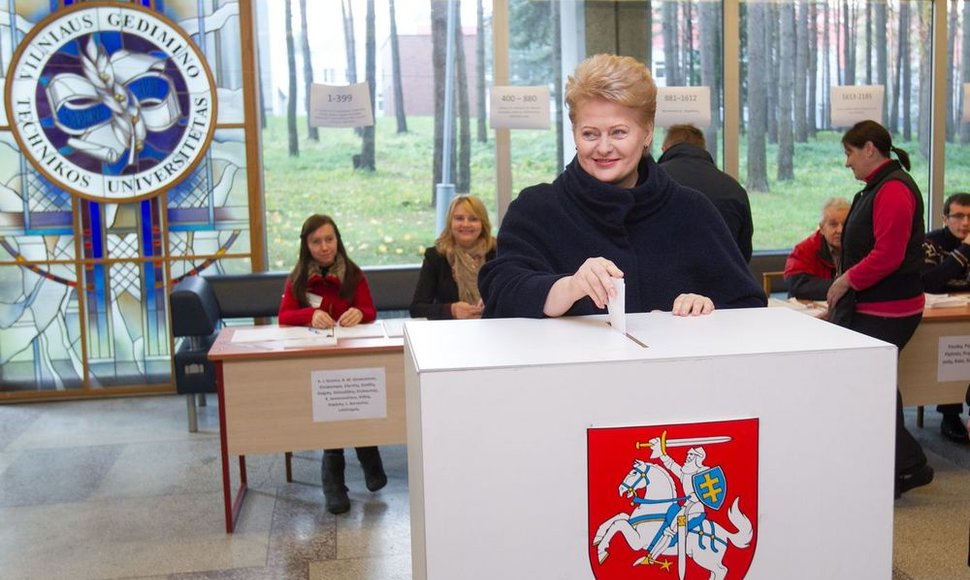Update 10:42 PM Asked to comment on Sunday's referendum on whether to build a new nuclear power plant in Lithuania, Prime Minister Andrius Kubilius, the leader of the conservative Homeland Union, asked journalists to wait for the results of the plebiscite.
"I am not going to speculate. The voter turn-out is very similar to what was in 2008. There was also a referendum back then, on extending the operation of the Ignalina nuclear power plant, which perhaps was not so controversial and which was initiated by the Social Democrats. That referendum failed (to pass the minimum threshold of voters)," Kubilius told BNS on Sunday night.
"I can say that, guessing from various discussions by those people or organizations backing the Visaginas nuclear power plant project, a considerable number of people, who support the nuclear power facility but oppose the referendum initiative, could have ignored the referendum," he said.
Asked why he had not called for a boycott of the referendum, Kubilius said that his party trusted in people's wisdom.
"We did not seek such an initiative, because we think that people are wise. The fact that this was how separate groups or organizations looked at the referendum is a democratic achievement as well," the prime minister said.
Update 10:40 PM Rolandas Paksas, leader of the Order and Justice Party, said his party hopes to form a coalition with the social democrats and the Labour Party after the Seimas elections.
"Today a preliminary agreement is with the labourers and social democrats. We talked that we'll try to form such a nucleus from these three parties. That's the situation today. What this night will show, the number of seats, is a matter of the morning. I hope it will mean continuity but I never say "no", Paksas told BNS on Sunday evening.
The results of the exit polls show that the Order and Justice Party will definitely lose out to the social democrats, the Labor Party and the conservatives and can receive a similar number of votes as the Liberal Movement and the political party the Path of Courage.
"Taking into account the fact the Constitutional Court recently eliminated the party leader just before the elections, the party passed the exam, and I am very glad that the results remained the same," Paksas said, referring to the Constitutional Court's recent decision to ban him from running for parliament.
Update 10:20 PM Lithuanian Prime Minister Andrius Kubilius has called the performance of his Homeland Union–Lithuanian Christian Democrats in the Seimas elections "a moral victory", and said he hoped the conservatives would manage to strengthen their position in the run-off.
"I would evaluate it as a very strong result, as a certain moral victory against those who estimated totally different results in the opinion polls and their various comments," he told the Lithuanian Radio on Sunday evening.
"The run-off might be rather successful. I hope that this way the continuity of work the ruling coalition has done so far will be guaranteed ," he added.
The conservatives came in third with 16.7 percent, according to the results of an exit poll survey carried out by BNS news agency and company RAIT. They were beaten by the Labour Party which received 19.8 percent and the Social Democrats (17.8 percent).
Update 9:45 PM It is not known yet if enough registered voters participated in Sunday's referendum on a new nuclear power plant in Lithuania for it to be valid, Zenonas Vaigauskas, chairman of the Central Electoral Commission, said.
Vaigauskas said that the turnout at the general elections exceeded 50 percent, but the number of voters who took part in the referendum, held in tandem with the polls, will only be known after the ballots are counted.
"A referendum is valid if more than half of voters participate in it. We will be able to say this only after the referendum ballots in the ballot boxes are counted, because we have received information that a certain number of voters refused to take referendum ballots," he said at a news conference.
Update 8:03 PM According to exit polls carried out by BNS, the biggest share of the vote should go to the Labour Party, followed by the Social Democratic Party and the current ruling Homeland Union - Lithuanian Christian Democrats (Conservatives).
The Labour Party is promised 19.8 percent of the vote. The Social Democrats, leaders of all previous opinion polls, is expected to get 17.8 percent. The ruling conservatives come in third, with 16.7 percent.
The Liberal Movement is predicted 8.5 percent. Another 8.5 percent of the vote can go to the newly-established Path of Courage party. The Order and Justice Party is expected to get 8.4 percent.
Other parties do not pass the 5-percent threshold to qualify for seats in the Seimas, according to the exit poll conducted by BNS and RAIT. Pollsters questioned 4,248 voters.
The Electoral Action of Poles in Lithuania, representing Lithuania's biggest national minority, is given 4.8 percent in the poll. Given the margin of error, the party still stands a chance of getting into parliament.
According to data published by the Central Electoral Commission, the turn-out before 7 PM, one hour before the polls close, was 44.59 percent.
Another 5 percent voted early at municipalities, by mail or at home earlier this week.
"General voter turnout was over 50 percent, and that's a record-high turnout in recent years," Zenonas Vaigauskas of the Central Electoral Commission said.
42.37 percent of voters voted by 7 PM in the last general elections in 2008, and another 3.99 percent voted early.
Viktor Uspaskich, leader of the Labour Party, said on Sunday evening that his party should forge a coalition with the Social Democrats and the Order and Justice Party.
"There's is no clear leader. There's a chance and possibility we'll have a majority made of at least three parties. I estimate that most probably it will be the Social Democrats, the Labour Party, and the Order and Justice Party," Uspaskich told BNS commenting on the results of exit polls.
Update 3:12 PM 25.79 percent of all eligible voters cast their ballot before 2 PM, head of the Central Electoral Commission Zenonas Vaigauskas told at a press conference.
"Voters are active enough, 25.79 percent have already come to the polls and the big question now is whether the turn-out will be above or below 50 percent," Vaigauskas said.
Polling districts are open from 7 AM until 8 PM. Those unable to come to vote at polling districts on Sunday were able to vote early earlier this week.
Some 5.4 percent of voters cast their ballots in the parliamentary elections by 10 AM on Sunday. Another 4.33 percent of voters took part in early voting, in addition to some more who voted at home on Saturday.
The voter turn-out in the 2008 parliamentary elections was 5.02 percent by 10 AM, 24.94 percent by 2 PM and 42.37 percent by 7 PM. Another 3.99 had cast votes in advance.
Leaders vote
After casting her ballot in the morning, President Dalia Grybauskaitė urged the nation to vote responsibly and elect those who are willing to take responsibility.
"While electing the Seimas, we are deciding the future for Lithuania. Let's vote responsibly and elect those who are ready to assume responsibility for the state. Everything is in our hands," Grybauskaitė said in a press release.
She told journalists in Vilnius it was not hard for her to pick a party to vote for.
"No, I had already made up my mind, you saw it didn't take me long," the president told reporters when asked whether it was difficult for her to make the decision.
She refused to guess on the ruling coalition to be formed after the elections.
"Time will show, I really do not want to speculate. I hope that people have decided before going to polling stations and they know what they know," she said.
 |
| BFl/Tomo Lukšio nuotr./Parliamentary Speaker Irena Degutienė casts her vote |
Parliamentary Speaker Irena Degutienė, one of the leaders of the ruling Homeland Union – Lithuanian Christian Democrats (conservatives), told reporters after casting her ballot she did not wish any political force to face the deep crisis the ruling coalition had to cope with.
"I probably wouldn't wish for any political force to come to power and immediately face an enormous crisis, which broke out in Lithuania and all Europe. It's certainly difficult for people to handle the consequences of the crisis. Some managed better, others didn't. Naturally, it was more difficult for the people of Lithuania to survive the four-year period when the Homeland Union and other coalition partners were in power," Degutienė said.
 |
| BFl/Tomo Lukšio nuotr./Prime Minister Andrius Kubilius |
Prime Minister Andrius Kubilius, leader of the ruling Homeland Union – Lithuanian Christian Democrats (conservatives), expressed hope on Sunday that responsible financial policies and ongoing energy projects would continue after the parliamentary elections.
After casting his ballot in Vilnius, the prime minister stated his government had to guarantee accountable financial policies over the past four years in office and launch restructuring of the energy sector.
"The four-year period was complicated, we had to make very responsible decisions, guarantee responsible financial policies, as the president has said, as well as start historic energy tasks. I believe the responsible policies continues," the prime minister told journalists.
"I voted in support of continuation of responsible policies. I hope that the continuity of work and people will be guaranteed," he added.
Kubilius refused to forecast the percentage of votes his party would receive in the elections and the majority to be formed after the polls.
The first voters in polling stations said they cast their votes early, as they had to work later on Sunday.
Election authorities said larger flows of voters were expected at around noon and later in the afternoon when people come after Church services or city residents return from out-of-town trips.
 |
| Irmanto Gelūno/15min.lt nuotr./Former President Valdas Adamkus |
Algirdas Butkevičius, leader of Lithuania's opposition Social Democratic Party, said he was convinced that his party would win 40 mandates in the country's 141-seat parliament, while Order and Justice party's leader Rolandas Paksas said the current ruling parties should not be in the government after the elections.
"Our earlier plan was between 40 and 45 seats. Now I think we should get about 40 mandates after the run-off," Butkevičius said after casting his vote in Vilnius.
Asked to specify the parties the Social Democrats could form a ruling coalition with, Butkevičius refused to give names but said they would be "parties that are elected to the Seimas and win public trust."
He said the Social Democrats would demand in the negotiations for future ruling posts that the winning party could propose its prime minister, finance minister, and foreign minister. In Butkevičius' words, the post of diplomacy chief is very important amid Lithuania's plans to preside over the Council of the European Union in the second half of 2013.
 |
| BFL/Tomo Lukšio nuotr./Rolandas Paksas and his wife vote |
Paksas, leader of the populist Order and Justice party, said that the elections should lead to coalition talks among his party, the Social Democrats, and the Labor Party.
"We started talking with the Labor Party and the Social Democrats. So far, the core remains the same and I think serious conversations in connection to forming a coalition will start, if we secure the votes we plan to get," Paksas told journalists after voting in the parliamentary elections on Sunday.
"The prime minister's post should go to the party that gets the highest number of votes among the three. It is natural – the party with most mandates and enjoying the highest public trust should claim the prime minister's position," he said.
 |
| Andriaus Ufarto/BFL nuotr./Algirdas Butekevičius of the Social Democratic Party |
Rules of the game
The Lithuanian Seimas consists of 141 members who are elected for a term of four years. Half of the members are elected on proportional representation basis (a party has to pass a 5-percent threshold to qualify for seats) while the rest are picked in 71 single-mandate constituencies.
All citizens of the Republic of Lithuania who are 18 years or older on the election day have the right to vote. Any citizen of the Republic of Lithuania who is not under allegiance to a foreign state and is at least 25 years old and who permanently resides in Lithuania may run for a seat in the Seimas.
17 political parties and one four-party coalition are running for parliament this year, a total of 1,927 candidates, including 127 incumbent MPs.
The elections are considered to have been held in the multi-member constituency if more than one fourth of all voters have participated in them. The listed candidates of the party can be awarded seats in the Seimas only if no less than 5 percent of the voters who cast their ballots voted for the party. A joint list of candidates may receive mandates provided that no less than 7 percent voted for it.
A candidate is considered elected in a single-member constituency if no less than 40 percent of the voters from the electoral roll of that constituency have participated in the election and the said candidate has received more than half of the vote. If the turn-out is below 40 percent, the winner is the candidate who has received most of the vote, provided that no less than one-fifth of all the registered voters cast their ballot for the candidate.
If more than two candidates have participated in the single-mandate election and none have qualified for the seat, a run-off voting is held two weeks later to pick one of the two candidates who received most votes.
An advisory, or non-binding, referendum on the construction of a new nuclear power plant is also taking place alongside the elections to the Seimas. An advisory referendum is considered valid if over one half of eligible voters take part. In the event that the turn-out is sufficient, a resolution is considered adopted if it is supported in at least half of all cast ballots. If the turn-out is less than 50 percent, the referendum is considered failed, though the legislators can still take into account the results in their deliberations.
2,579,466 people, including around 14,000 people who have registered to vote abroad, have the right to vote in the Seimas elections.













































